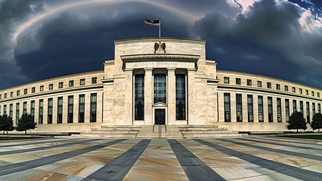
Republic First Crashes and Burns
Republic First Bancorp's collapse and rescue by Fulton Financial signal deeper troubles looming for regional banks.

Republic First Bancorp's collapse and rescue by Fulton Financial signal deeper troubles looming for regional banks.

The U.S. housing market has seen median home prices soar to a record $383,725 with mortgage rates reaching 7.1%.

Ahead of the Bank of Japan's meeting, the yen has plummeted to a 34-year low against the U.S. dollar, driven by significant yield disparities and shifting investor preferences.

More and more news reports come out concerning the booming economy- but underneath the surface, things are not as they seem. Can we even trust the veracity of the data anymore?

The FDIC is seeking buyers for the financially troubled Republic First Bancorp, intensifying efforts to stabilize the bank and protect stakeholders after a major investment deal collapsed.

Following the Francis Scott Key Bridge collapse, Baltimore officials are opening a new, deeper channel to quickly restore port operations.

Facing tariffs, China's steel industry grapples with international criticism and changing global demand.

A Redfin survey reveals that 38% of U.S. renters now believe homeownership is unattainable, driven by rising home prices, steep mortgage rates, and increasing financial hurdles.

Republic First Bancorp's collapse and rescue by Fulton Financial signal deeper troubles looming for regional banks.

The U.S. housing market has seen median home prices soar to a record $383,725 with mortgage rates reaching 7.1%.

Ahead of the Bank of Japan's meeting, the yen has plummeted to a 34-year low against the U.S. dollar, driven by significant yield disparities and shifting investor preferences.

More and more news reports come out concerning the booming economy- but underneath the surface, things are not as they seem. Can we even trust the veracity of the data anymore?

The FDIC is seeking buyers for the financially troubled Republic First Bancorp, intensifying efforts to stabilize the bank and protect stakeholders after a major investment deal collapsed.

Following the Francis Scott Key Bridge collapse, Baltimore officials are opening a new, deeper channel to quickly restore port operations.

Facing tariffs, China's steel industry grapples with international criticism and changing global demand.

A Redfin survey reveals that 38% of U.S. renters now believe homeownership is unattainable, driven by rising home prices, steep mortgage rates, and increasing financial hurdles.

The Federal Reserve's financial stability report reveals significant economic vulnerabilities, highlighting overvalued stock markets, deteriorating credit conditions, and commercial real estate uncertainties.

A ATTOM report reveals a significant increase in U.S. commercial foreclosures, with a 117% rise year-over-year, highlighting growing instability in the commercial real estate market.

Creditnews Research's study reveals a dramatic decline in housing affordability, with middle-class households in the U.S. now able to afford homes in only 52 of the 100 largest metros, down from 91 in 2019.

Following the collapse of Silicon Valley Bank, the Federal Reserve revealed that 1,804 financial institutions utilized the Bank Term Funding Program, which issued $165 billion in loans.

March saw a significant decline in single-family home construction, intensifying challenges in the U.S. housing market due to rising mortgage rates and a shrinking supply.

Amid rising inflation and geopolitical tensions, gold prices have surged.
